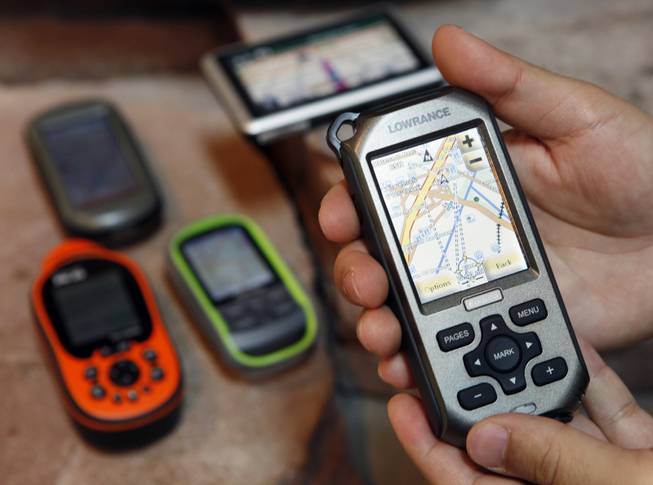
Ed Andrieski / AP
A salesman shows some of the most popular GPS units available. Concerns have been raised that a wireless network to be tested in the Las Vegas area could overpower GPS signals, potentially crippling a technology that is engrained in our daily lives.
Saturday, May 21, 2011 | 2 a.m.
Sun archives
Beyond the Sun
Southern Nevadans are about halfway through a controversial high-tech broadband experiment that has some biting their fingernails, but so far there have been no problems.
LightSquared of Reston, Va., is testing a planned 4G speed wireless network that promises to unleash the full power of the mobile Internet on a public hungry for faster and more efficient delivery.
The hiccup, according to critics, is that the frequencies the privately held company intends to use are so powerful they could disrupt the Global Positioning System, or GPS, navigational signals that airplane pilots, emergency first responders and ordinary motorists use to reach their destinations safely. But since testing began in the Las Vegas area last Monday, no planes have fallen from the sky and no other major GPS interruptions have occurred, authorities say.
Federal Aviation Administration spokesman Ian Gregor, whose agency issued an advisory to pilots about the testing, said the FAA will withhold comment “until we have had a chance to thoroughly evaluate the results.”
But no members of the Clark County Aviation Association, whose noncommercial pilots fly out of Southern Nevada’s smaller airports, have reported any problems so far with their GPS navigational systems, association President David Lerner said.
“Everybody is in tune with it, so I don’t expect any problems,” Lerner said.
Officer Bill Cassell, a Metro Police spokesman, likewise said that his agency has experienced no problems.
“There have been no anomalies, nothing,” Cassell said of the testing. “We’ve been watching it and there has been absolutely nothing shown on our radar attributable to it. It’s business as usual.”
Same goes for Las Vegas Fire & Rescue, according to spokesman Tim Szymanski. He said his agency has experienced no interruptions yet but if it did, it has a computerized mapping system that first responders have been trained to use. Although the agency uses GPS to help reach fires, it also has relied on special map books from before the time GPS existed, he said.
The Coalition to Save Our GPS, whose members include Caterpillar, FedEx, UPS and the Aircraft Owners and Pilots Association, is still worried about the testing, arguing that the LightSquared signals would be at least a billion times more powerful than neighboring GPS frequencies.
Coalition spokesman Dale Leibach in Washington said it is difficult to draw conclusions from the Las Vegas testing so far because LightSquared is monitoring possible interference with GPS signals in a way that may not be noticeable to airplane pilots and emergency first responders.
“It’s not intended to blanket Las Vegas with a signal and then wait to hear who might be impacted,” Leibach said.
There’s still more to be learned, since testing is scheduled to continue through Friday. But LightSquared spokeswoman Audrey Schaefer said “we haven’t heard any complaints” about the testing, which mostly takes place from midnight to 6 a.m.
Schaefer said other participants in the testing include the FAA, Defense Department, federal Transportation Department, National Telecommunications and Information Administration, and GPS and wireless industry representatives. They plan to issue a report on the test results to the Federal Communications Commission on June 15.
LightSquared, which received conditional approval from the FCC to erect tens of thousands of ground transmitters that would be linked to a Boeing-built satellite, has expressed confidence that it will operate the nation’s first successful wholesale-only wireless broadband network.
LightSquared plans to sell its service to wired and wireless communication providers, cable operators, device manufacturers, Web players, content providers and others. And the company expects to serve 100 million Americans by 2012 and 92 percent of the nation’s population by 2015.

Join the Discussion:
Check this out for a full explanation of our conversion to the LiveFyre commenting system and instructions on how to sign up for an account.
Full comments policy